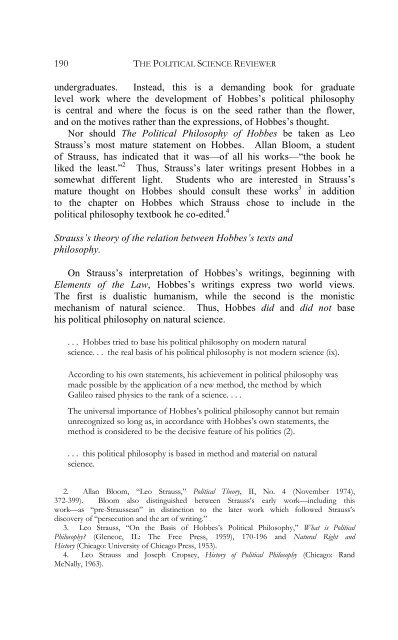Strauss and Watkins on Hobbes' Political Philosophy: A Review
Strauss and Watkins on Hobbes' Political Philosophy: A Review
Strauss and Watkins on Hobbes' Political Philosophy: A Review
Create successful ePaper yourself
Turn your PDF publications into a flip-book with our unique Google optimized e-Paper software.
190 THE POLITICAL SCIENCE REVIEWER<br />
undergraduates. Instead, this is a dem<str<strong>on</strong>g>and</str<strong>on</strong>g>ing book for graduate<br />
level work where the development of Hobbes’s political philosophy<br />
is central <str<strong>on</strong>g>and</str<strong>on</strong>g> where the focus is <strong>on</strong> the seed rather than the flower,<br />
<str<strong>on</strong>g>and</str<strong>on</strong>g> <strong>on</strong> the motives rather than the expressi<strong>on</strong>s, of Hobbes’s thought.<br />
Nor should The <strong>Political</strong> <strong>Philosophy</strong> of Hobbes be taken as Leo<br />
<str<strong>on</strong>g>Strauss</str<strong>on</strong>g>’s most mature statement <strong>on</strong> Hobbes. Allan Bloom, a student<br />
of <str<strong>on</strong>g>Strauss</str<strong>on</strong>g>, has indicated that it was—of all his works—“the book he<br />
liked the least.” 2 Thus, <str<strong>on</strong>g>Strauss</str<strong>on</strong>g>’s later writings present Hobbes in a<br />
somewhat different light. Students who are interested in <str<strong>on</strong>g>Strauss</str<strong>on</strong>g>’s<br />
mature thought <strong>on</strong> Hobbes should c<strong>on</strong>sult these works 3 in additi<strong>on</strong><br />
to the chapter <strong>on</strong> Hobbes which <str<strong>on</strong>g>Strauss</str<strong>on</strong>g> chose to include in the<br />
political philosophy textbook he co-edited. 4<br />
<str<strong>on</strong>g>Strauss</str<strong>on</strong>g>’s theory of the relati<strong>on</strong> between Hobbes’s texts <str<strong>on</strong>g>and</str<strong>on</strong>g><br />
philosophy.<br />
On <str<strong>on</strong>g>Strauss</str<strong>on</strong>g>’s interpretati<strong>on</strong> of Hobbes’s writings, beginning with<br />
Elements of the Law, Hobbes’s writings express two world views.<br />
The first is dualistic humanism, while the sec<strong>on</strong>d is the m<strong>on</strong>istic<br />
mechanism of natural science. Thus, Hobbes did <str<strong>on</strong>g>and</str<strong>on</strong>g> did not base<br />
his political philosophy <strong>on</strong> natural science.<br />
. . . Hobbes tried to base his political philosophy <strong>on</strong> modern natural<br />
science. . . the real basis of his political philosophy is not modern science (ix).<br />
According to his own statements, his achievement in political philosophy was<br />
made possible by the applicati<strong>on</strong> of a new method, the method by which<br />
Galileo raised physics to the rank of a science. . . .<br />
The universal importance of Hobbes’s political philosophy cannot but remain<br />
unrecognized so l<strong>on</strong>g as, in accordance with Hobbes’s own statements, the<br />
method is c<strong>on</strong>sidered to be the decisive feature of his politics (2).<br />
. . . this political philosophy is based in method <str<strong>on</strong>g>and</str<strong>on</strong>g> material <strong>on</strong> natural<br />
science.<br />
2. Allan Bloom, “Leo <str<strong>on</strong>g>Strauss</str<strong>on</strong>g>,” <strong>Political</strong> Theory, II, No. 4 (November 1974),<br />
372-399). Bloom also distinguished between <str<strong>on</strong>g>Strauss</str<strong>on</strong>g>’s early work—including this<br />
work—as “pre-<str<strong>on</strong>g>Strauss</str<strong>on</strong>g>ean” in distincti<strong>on</strong> to the later work which followed <str<strong>on</strong>g>Strauss</str<strong>on</strong>g>’s<br />
discovery of “persecuti<strong>on</strong> <str<strong>on</strong>g>and</str<strong>on</strong>g> the art of writing.”<br />
3. Leo <str<strong>on</strong>g>Strauss</str<strong>on</strong>g>, “On the Basis of Hobbes’s <strong>Political</strong> <strong>Philosophy</strong>,” What is <strong>Political</strong><br />
<strong>Philosophy</strong>? (Glencoe, IL: The Free Press, 1959), 170-196 <str<strong>on</strong>g>and</str<strong>on</strong>g> Natural Right <str<strong>on</strong>g>and</str<strong>on</strong>g><br />
History (Chicago: University of Chicago Press, 1953).<br />
4. Leo <str<strong>on</strong>g>Strauss</str<strong>on</strong>g> <str<strong>on</strong>g>and</str<strong>on</strong>g> Joseph Cropsey, History of <strong>Political</strong> <strong>Philosophy</strong> (Chicago: R<str<strong>on</strong>g>and</str<strong>on</strong>g><br />
McNally, 1963).
















